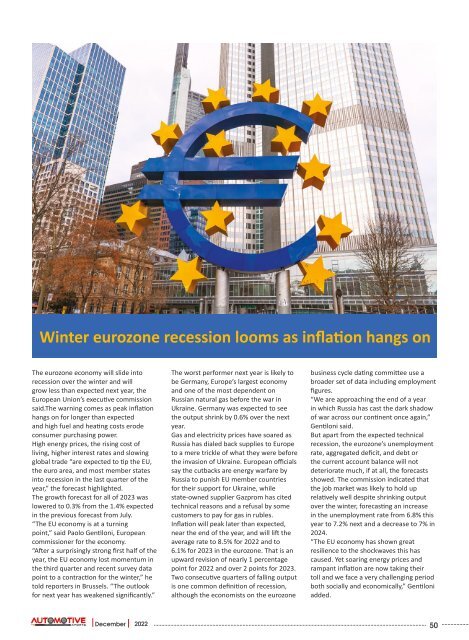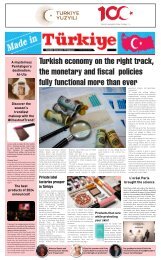Automotive Exports December 2022
You also want an ePaper? Increase the reach of your titles
YUMPU automatically turns print PDFs into web optimized ePapers that Google loves.
Winter eurozone recession looms as inflation hangs on<br />
The eurozone economy will slide into<br />
recession over the winter and will<br />
grow less than expected next year, the<br />
European Union’s executive commission<br />
said.The warning comes as peak inflation<br />
hangs on for longer than expected<br />
and high fuel and heating costs erode<br />
consumer purchasing power.<br />
High energy prices, the rising cost of<br />
living, higher interest rates and slowing<br />
global trade “are expected to tip the EU,<br />
the euro area, and most member states<br />
into recession in the last quarter of the<br />
year,” the forecast highlighted.<br />
The growth forecast for all of 2023 was<br />
lowered to 0.3% from the 1.4% expected<br />
in the previous forecast from July.<br />
“The EU economy is at a turning<br />
point,” said Paolo Gentiloni, European<br />
commissioner for the economy.<br />
“After a surprisingly strong first half of the<br />
year, the EU economy lost momentum in<br />
the third quarter and recent survey data<br />
point to a contraction for the winter,” he<br />
told reporters in Brussels. “The outlook<br />
for next year has weakened significantly.”<br />
The worst performer next year is likely to<br />
be Germany, Europe’s largest economy<br />
and one of the most dependent on<br />
Russian natural gas before the war in<br />
Ukraine. Germany was expected to see<br />
the output shrink by 0.6% over the next<br />
year.<br />
Gas and electricity prices have soared as<br />
Russia has dialed back supplies to Europe<br />
to a mere trickle of what they were before<br />
the invasion of Ukraine. European officials<br />
say the cutbacks are energy warfare by<br />
Russia to punish EU member countries<br />
for their support for Ukraine, while<br />
state-owned supplier Gazprom has cited<br />
technical reasons and a refusal by some<br />
customers to pay for gas in rubles.<br />
Inflation will peak later than expected,<br />
near the end of the year, and will lift the<br />
average rate to 8.5% for <strong>2022</strong> and to<br />
6.1% for 2023 in the eurozone. That is an<br />
upward revision of nearly 1 percentage<br />
point for <strong>2022</strong> and over 2 points for 2023.<br />
Two consecutive quarters of falling output<br />
is one common definition of recession,<br />
although the economists on the eurozone<br />
business cycle dating committee use a<br />
broader set of data including employment<br />
figures.<br />
“We are approaching the end of a year<br />
in which Russia has cast the dark shadow<br />
of war across our continent once again,”<br />
Gentiloni said.<br />
But apart from the expected technical<br />
recession, the eurozone’s unemployment<br />
rate, aggregated deficit, and debt or<br />
the current account balance will not<br />
deteriorate much, if at all, the forecasts<br />
showed. The commission indicated that<br />
the job market was likely to hold up<br />
relatively well despite shrinking output<br />
over the winter, forecasting an increase<br />
in the unemployment rate from 6.8% this<br />
year to 7.2% next and a decrease to 7% in<br />
2024.<br />
“The EU economy has shown great<br />
resilience to the shockwaves this has<br />
caused. Yet soaring energy prices and<br />
rampant inflation are now taking their<br />
toll and we face a very challenging period<br />
both socially and economically,” Gentiloni<br />
added.<br />
<strong>December</strong> <strong>2022</strong> 50

















